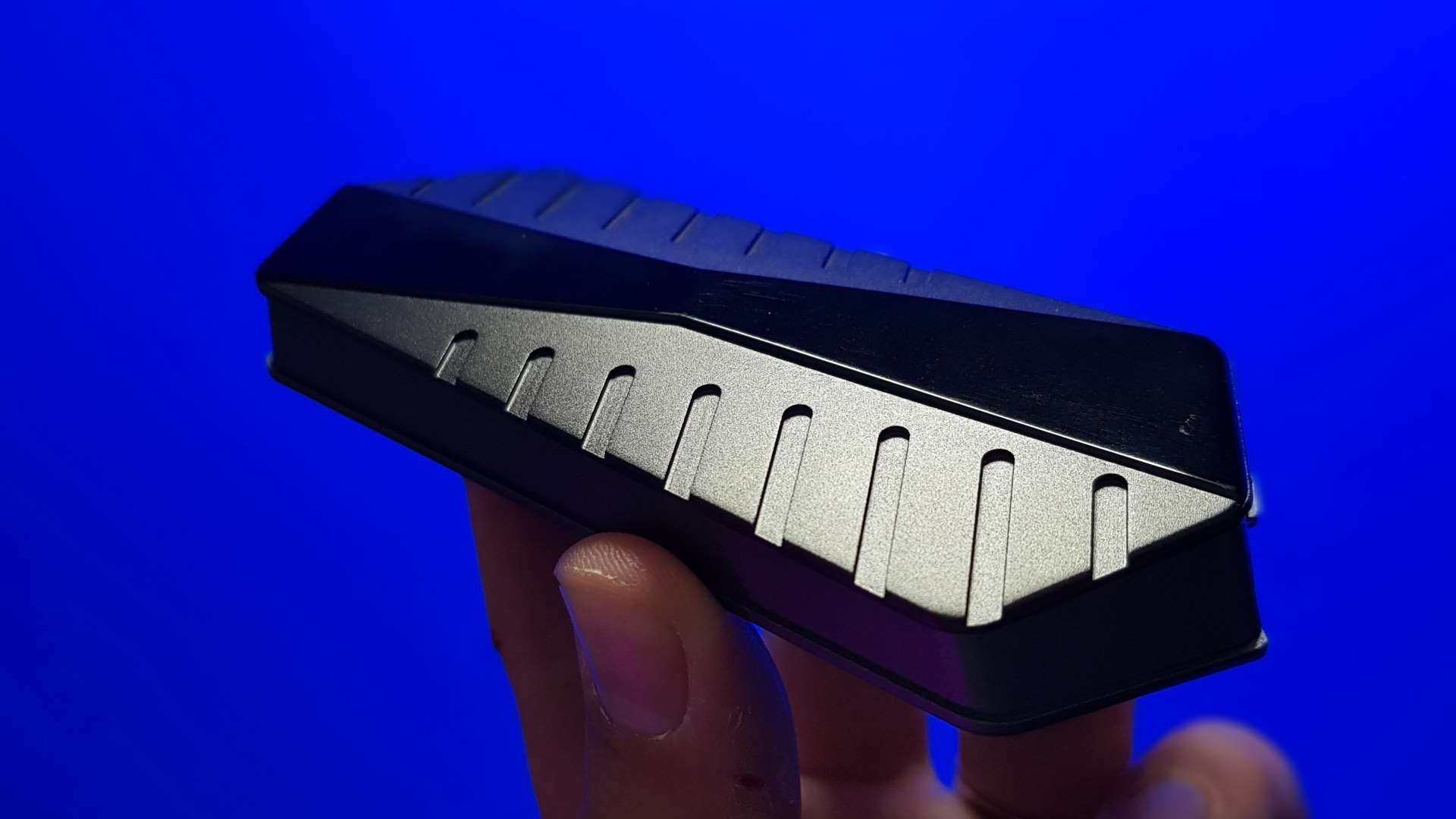Our Verdict
The GigaDrive is at once an impressive piece of kit and also a bizarrely performing external drive. Large file transfers are lightning, while small files are sluggish over the Thunderbolt connection.
For
- High sequential speeds
- Robust IP67 enclosure
- It's a portable SN750
Against
- Will be 48% more expensive soon
- Sluggish 4k write performance on Thunderbolt
PC Gamer's got your back
Update May 4, 2022: Having missed the initial shipping period for its GigaDrive units, the last update on Indiegogo suggested production would be complete in April or May this year. Sadly, there has been no update since and we've been unable to contact GigaDrive as it looks like their email addresses have been shut down.
Backers have filled out refund forms and as yet have not heard anything from the company, and the comments section of the project is filled with complaints. We have contacted Indiegogo to see if it might have some information about the project, and will update with any information we might find out.
Original review April 30, 2021: The new GigaDrive promises to be the world's fastest external SSD, and given that it's using one of our favourite NVMe SSDs at its heart, its pace comes as no surprise. Its Thunderbolt 4 / USB4 connection is what gives it some seriously impressive peak numbers, but also seems to be a limiting factor in real-world performance.
As game sizes get bigger, the idea of using an external SSD to bolster the storage capacity of your gaming laptop, or even your next-gen console, is a far more appealing one. Both laptops and consoles have finite amounts of space inside them and are a lot tougher to permanently expand than a standard desktop gaming PC.
With no moving parts, lightning speeds, and easy connections, SSDs are the perfect partner to your gaming machines and are now fast enough that running games directly from an external drive should be no impediment to your gaming performance.
GigaDrive is aiming to come in at the top of that market and has been selling direct to its customers via IndieGogo for a little while now. The 1TB drive we've been checking out retails for an impressively low $153. That is a limited time deal, however, as the company is looking to move beyond the crowd-funding platform and is estimating that its pricing will rise by almost 50%.
Connection: Thunderbolt 4 / USB4
Capacity: 1TB (available up to 8TB)
Dimensions: 37mm x 114mm x 12.5m
Weight: 74g
IP rating: IP67
That might end up feeling like a bit of a sting given that the quickest 1TB external drive we've tested—the WD Black P50 Game Drive—comes in at $250 and GigaDrive is expecting to soon hit the $299 mark.
Which is an interesting comparison given that this Thunderbolt drive is actually using a WD Black SN750 SSD as the basis for the device, hidden inside a rugged enclosure with a built-in heatsink. With an IP67 rating, the GigaDrive can sure take a pounding. It's rated to survive for half an hour submerged in a meter of water and has apparently been drop-tested from ten feet.

I can attest to a certain solidity having carried out my own inadvertent 3.6ft drop-test from my standing desk. It's still going after hitting my hard flooring edge-first, which is a definite bonus.
It does also manage to stay pretty chill inside that angular black shroud; a cover that is more than reminiscent of the heatsink you can cloth the WD Black SN750 in when used for internal duties in your PC. With a peak of 49°C after sustained use, it's clear the GigaDrive isn't going to melt its silicon run ragged in the field.
Performance-wise though there are some interesting things that pop up due to that Thunderbolt 4 interface. The peak read/write speeds are great, with performance topping 2,400MB/s and 2,200MB/s respectively. In our ATTO and AS SSD synthetic tests we didn't see the GigaDrive hitting its rated 2,800MB/s peaks, but these benchmarks rarely see a drive reaching its full potential.
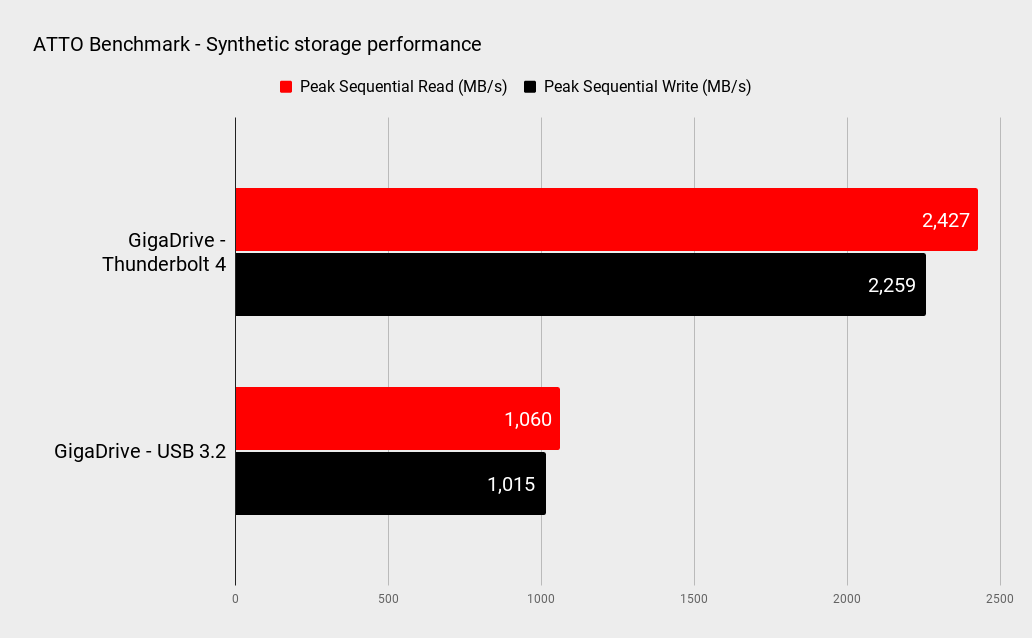
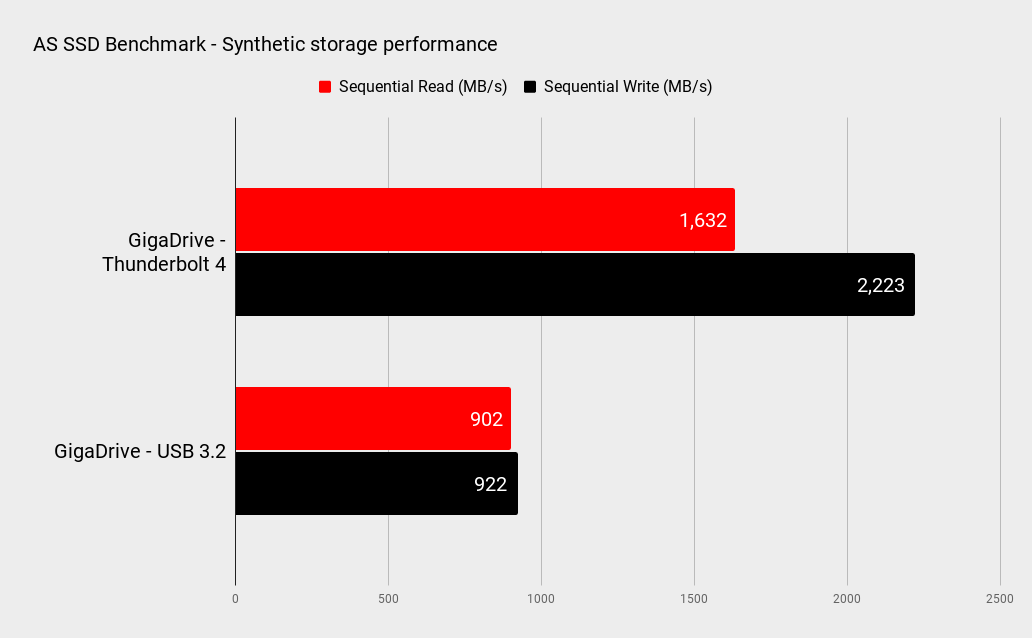
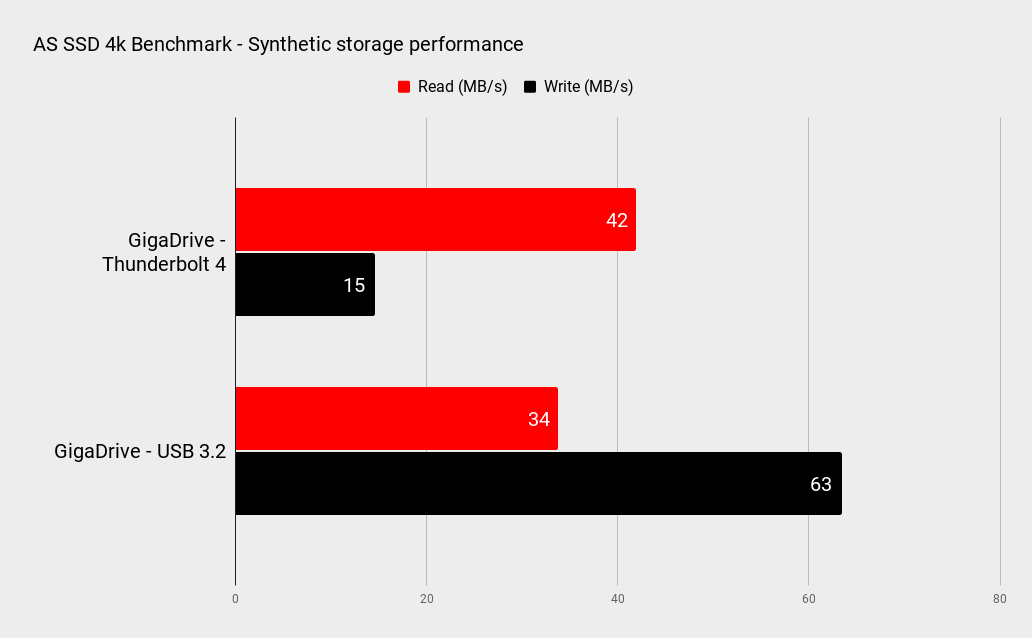

That's when I was plumbed into our Asus ROG Maximus XIII Hero Z590 test board, with Thunderbolt 4 connections. Connecting via USB instead sees the drive saturating the interface, with peak performance sticking at 1,000MB/s.
So, Thunderbolt is absolutely the way forward for the GigaDrive then? Actually, those sequential performance numbers only tell part of the story. They're great for detailing large file transfers of something like 4K video for editing, but for mixed file types or running a game, they're maybe not as effective.
That's where the small 4k file performance is interesting. This details how well the drive and interface manage the many small read/write operations an SSD might go through when running software directly from the drive itself. For internal SSDs this is a great metric for general snappiness running a Windows OS, but for external drives it's useful to see how effective it might be for holding a semi-permanent game library, for instance.
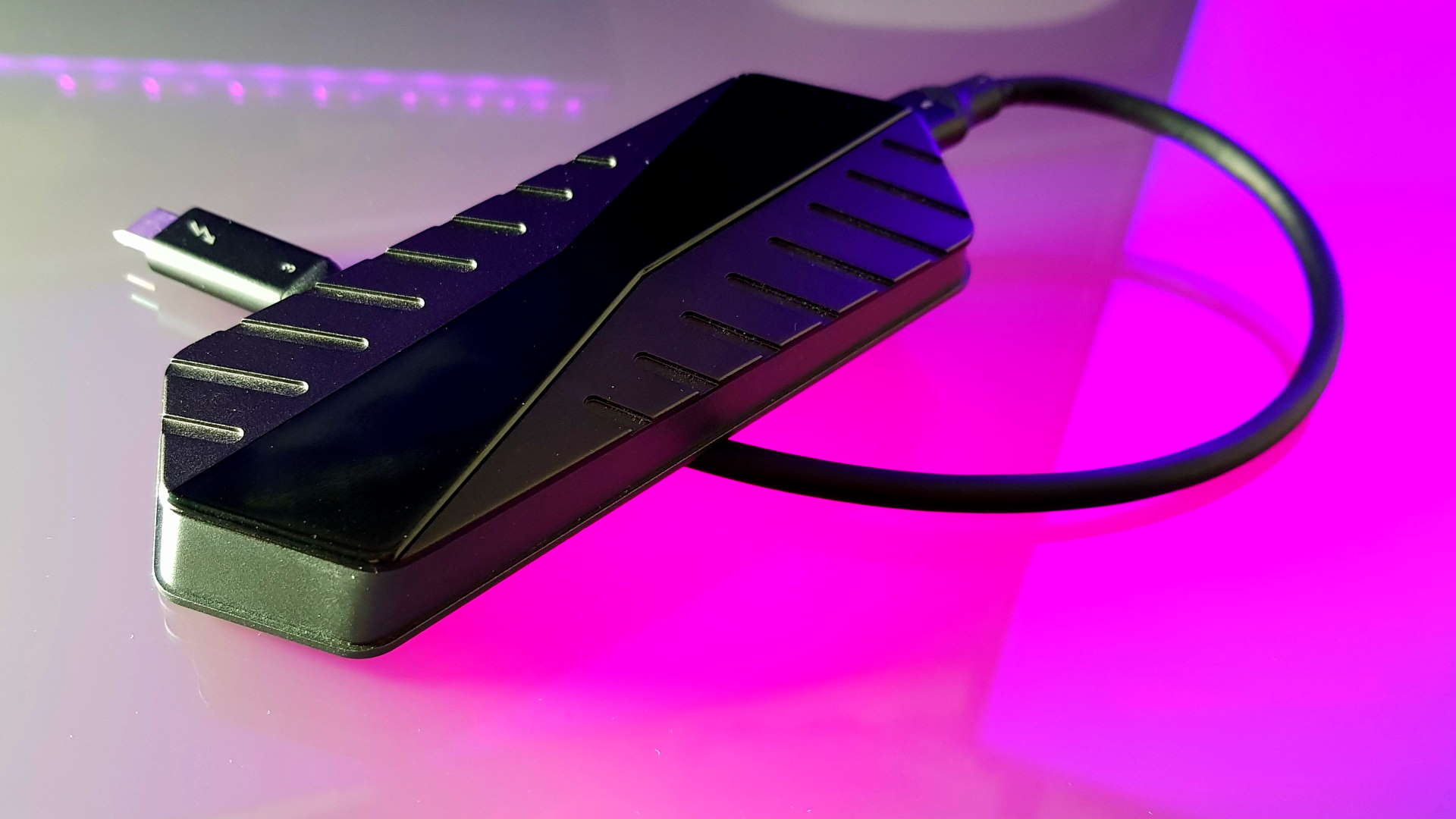
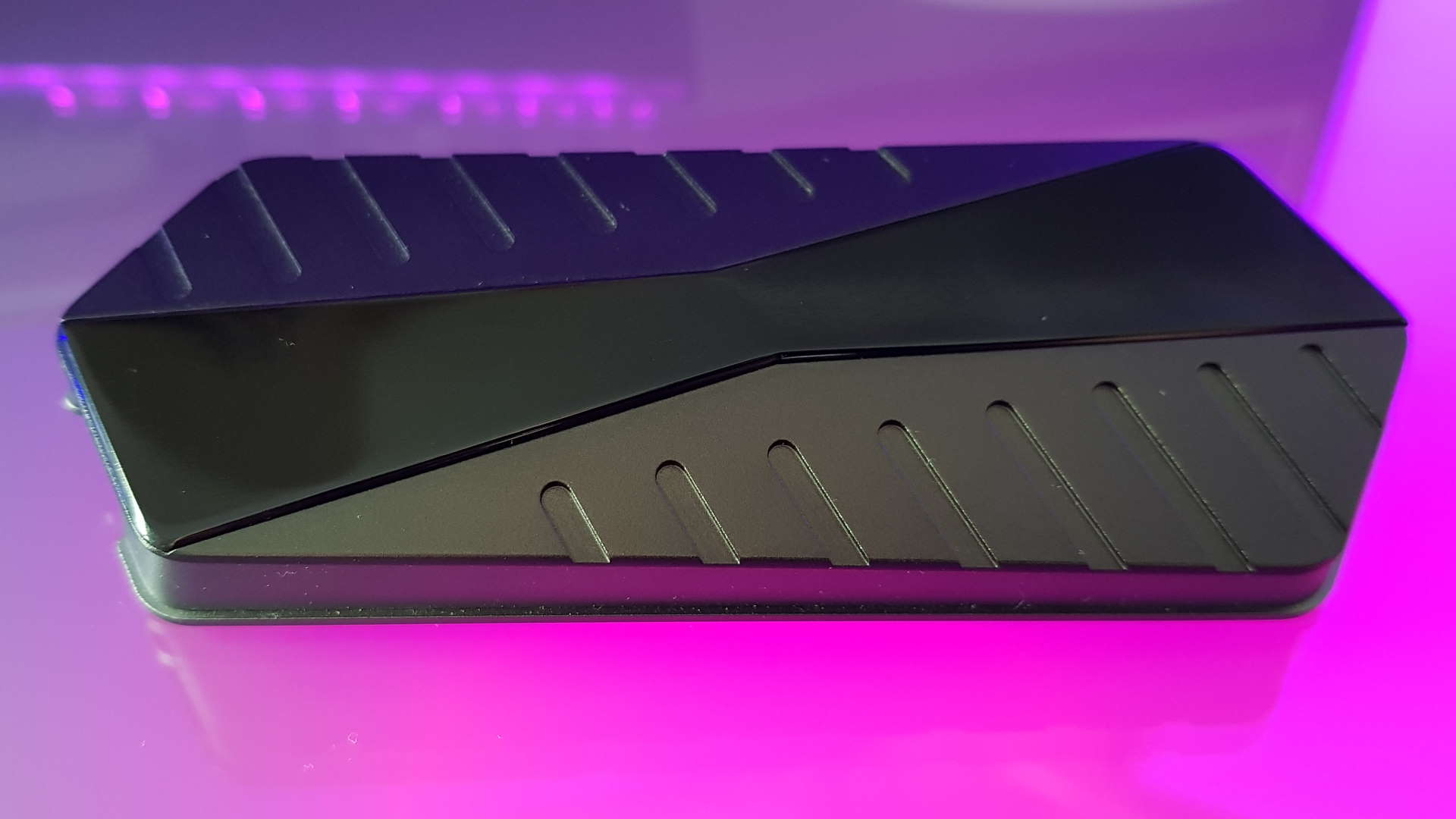
And this is where the GigaDrive and its Thunderbolt 4 connection falls down. The 4k write performance is really low; a tenth of what the WD Black SN750 drive is capable of when connected to an NVMe interface. At just 15MB/s it's also 76% lower than the GigaDrive's 4k write speed when connected to a USB 3.2 connection.
That also makes some game transfers rather slow. Our 30GB file transfer test folder is made up of many different file types and game installs, and so comes with a host of teeny tiny files. As such the folder copy test took 284 seconds over Thunderbolt and just 206 seconds over USB 3.2.
That makes the GigaDrive a bit of an oddity. Tech-wise, it's right up there with the best of external SSDs on offer, but that Thunderbolt connection really seems to struggle. The peak sequential performance of an SSD is more about bragging rights when you're pushing beyond 1GB/s at the moment, and that makes real-world speeds a more vital part of the storage equation.
Interestingly the GigaDrive has both, you just need to use a different connection for each.
The GigaDrive is at once an impressive piece of kit and also a bizarrely performing external drive. Large file transfers are lightning, while small files are sluggish over the Thunderbolt connection.

Dave has been gaming since the days of Zaxxon and Lady Bug on the Colecovision, and code books for the Commodore Vic 20 (Death Race 2000!). He built his first gaming PC at the tender age of 16, and finally finished bug-fixing the Cyrix-based system around a year later. When he dropped it out of the window. He first started writing for Official PlayStation Magazine and Xbox World many decades ago, then moved onto PC Format full-time, then PC Gamer, TechRadar, and T3 among others. Now he's back, writing about the nightmarish graphics card market, CPUs with more cores than sense, gaming laptops hotter than the sun, and SSDs more capacious than a Cybertruck.
